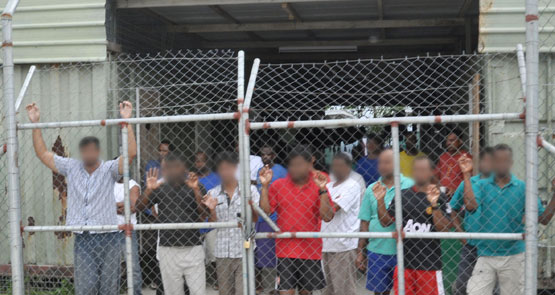
Asylum seekers inside the Manus Island detention centre
The government of Papua New Guinea and the Australian Department of Immigration and Border Protection could face another crisis in the Manus Island detention centre next week as the government moves to hastily recruit contractors to process all asylum seeker appeal claims and house asylum seekers in separate compounds based on whether they are found to be refugees.
The rush is on to clear the detention centre ahead of a looming PNG Supreme Court challenge to the legality of the centre. The 850 male asylum seekers in the Manus Island detention centre have been told that all refugee claims will be processed as soon as possible, with those found to be not genuine refugees given until the end of June to resolve their appeals. In order to get through that process quickly, on March 16 the Department of Immigration and Border Protection sent out an expression-of-interest email seeking applicants for a merits review panel to assess refugee reviews before a final determination by Immigration Minister Peter Dutton.
According to the EOI email, seen by Crikey, the role would require the panel members to travel to Manus, complete “1-2 circuits comprising approximately 10 cases/interviews” per circuit, at which point members would return to Australia to write up their decisions. Although technically the staff would be working on behalf of the PNG government, all travel, accommodation and visa processing is to be handled by DIBP. So fast was the recruitment process that the PNG government would only review CVs and conduct a “brief interview” over the phone. Applications were only open for a week, and their three-month contracts for the panel are expected to commence in early April.
Next Wednesday, the PNG Immigration Department will separate those found to be refugees from those considered not to be refugees into different compounds. Those who have to move are being given incentives to move before the deadline by being offered more points to use in the detention centre canteen, but those who refuse to move will be punished by having points deducted, and they face being forcibly moved.
“The message was clear for us — whether you are a refugee or not, they want to clear the detention centre. But there is no safety in PNG,” one refugee reportedly told the Refugee Action Coalition.
Close to 400 of the men in Manus have been found to be refugees, and another 59 are in a transit centre waiting to be moved into resettlement in PNG. Some are refusing to resettle on PNG, claiming it is unsafe — for evidence, they point to Iranian asylum seeker Reza Barati, who was was beaten to death during an incident in the detention centre in February 2014. The government-commissioned independent report into Barati’s death blamed to PNG locals hired as guards for the murder.
“When he fall down, more than 10 officer passed him and all of them, they kicked him in his head … I can recognise all of them, it was including PNG locals, PNG guards, and Australian expats,” a witness was quoted as stating in the report.
A trial for two locals charged with Barati’s murder was held in September last year, but the case has reportedly been re-opened with hearings for this year, after the two men charged claimed their right to a fair trial had been breached. The key witness in the case is still detained in the Manus Island centre, and according to Guardian Australia, fears for his life due to testifying in the trial.
Refugee Action Coalition’s Ian Rintoul told Crikey that a few asylum seekers had said they would move when asked, but most said they wouldn’t. He says Immigration has been warning detainees not to interfere with attempts to move people.
An upcoming Supreme Court case in Papua New Guinea which is squarely aimed at challenging the constitutionality of the PNG government’s ability to detain refugees without charge. The case is due to be heard in late April, with a directions hearing before that set down for Monday, April 4.








It would be amazing, Joshua, if those wanting to enjoy a better economic life in Australia didn’t pull publicity stunts they know people such as you in the West will milk to the full.
The sheer political bastardy pursued by Minister for Immigration in defiance of “duty of care” responsibilities beggars all comprehension. We are indeed a pariah nation in the eyes of all who witness . . . .
So that’s a really rigorous recruitment process for those deciding the life prospects of those men. And their families. Un&@”;&($beleivable.